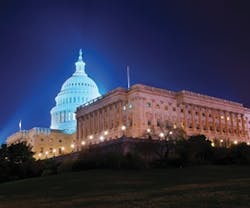After a nerve-wracking holiday season with the country teetering on the very edge of the fiscal cliff, Congress passed 11th hour legislation to avert ruin and panic.
However, the bill did not raise the debt ceiling and only delayed the impending sequester – a series of automatic federal spending cuts that will reduce the budgets of most agencies and programs by 8-10% – effectively kicking the can down the road for two additional months.
So what can we expect from the 113th Congress? With a largely "status quo" assortment of legislators, our best guess is that we'll have a "status quo" outcome. But that isn't necessarily bad.
With so many issues on the table that could potentially have a major impact on our country and our industry, a slow and deliberative process is preferable to knee-jerk reactions and a flurry of legislative activity where legislators vote on bills they haven't even had a chance to read.
Here are three top issues that commercial real estate professionals should keep tabs on.PageBreak
1) Battles over Tax Reform
Tax issues will remain front and center even though Congress managed to avert the fiscal cliff until March and dealt with the assortment of expiring tax provisions. In HR 8, they extended the 15-year depreciation period for leasehold improvements and permanently enacted the expiring 15% capital gains rate for taxpayers making up to $400,000 if single and $450,000 if married, with a 20% rate above that threshold in both cases.
Most in Congress firmly believe that a simpler, fairer tax code is much needed, but that doesn't mean there will be any easy agreements. Tax reform will be a lengthy, multi-year exercise, promising to become even more difficult now because some of the newly elected legislators line up on the far fringes of their parties.
As we saw in the deliberations over averting the fiscal cliff, if party leaders can't even align their own membership, it's very difficult to negotiate with the other side.
2) Further Energy Efficiency Mandates
Throughout the last session of Congress, we saw very little activity on energy policy. Once the Republicans took control of the House, any climate change or cap and trade proposals were immediately taken off the table. However, if President Obama's inaugural address is any indication, the issues will arise again early in the session due mainly to the ravaging effects of Superstorm Sandy on the northeast.
Also, Sen. Ron Wyden (D-OR), who is taking over the helm of the Senate Energy and Natural Resources Committee from retiring Sen. Jeff Bingaman (D-NM), has already stated his intent to pass a comprehensive energy bill. While it is too soon to know what will be included, it's safe to assume that energy efficiency mandates for commercial real estate will once again be on the menu.
3) The Demise of Terrorism Risk Insurance
Immediately following 9/11, it became obvious that the insurance and reinsurance industry couldn't provide terrorism risk insurance coverage for the commercial real estate industry under reasonable rates and terms to meet the new realities of the changing face of terrorism. Stakeholders stepped up to work with Congress, and the Terrorism Risk Insurance Act (TRIA) was enacted in 2002. TRIA was subsequently extended in 2005, revamped in 2007, and extended through the end of 2014.
Though TRIA was intended to be a short-term program, this federal reinsurance backstop is the sole support of the U.S. market for terrorism risk insurance and must be further extended or made permanent. This will be a tough sell, as Congress does not typically like to create new permanent programs.
Absent an extension, building owners can expect to see new and existing policies exclude acts of terrorism once the program lapses on Jan. 1, 2015.
Karen Penafiel is vice president of advocacy, codes, and standards for BOMA International. She can be reached at [email protected]. For more information on this and other topics, call BOMA International at (202) 408-2662 or visit www.boma.org.
